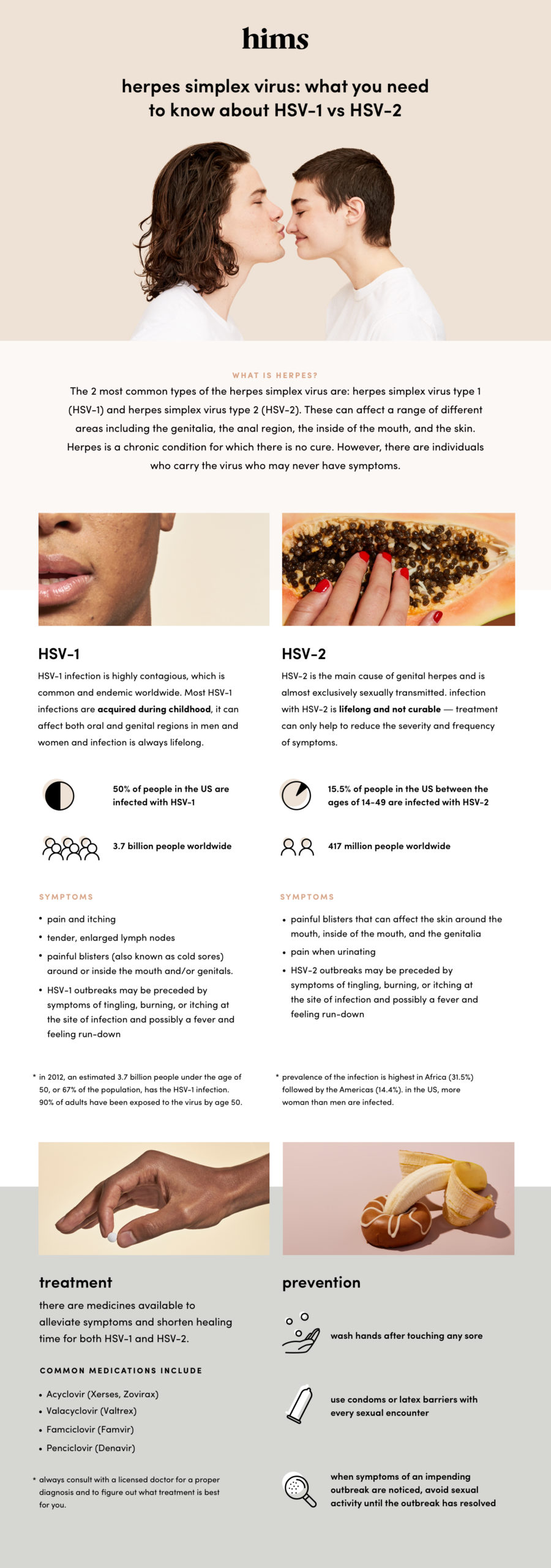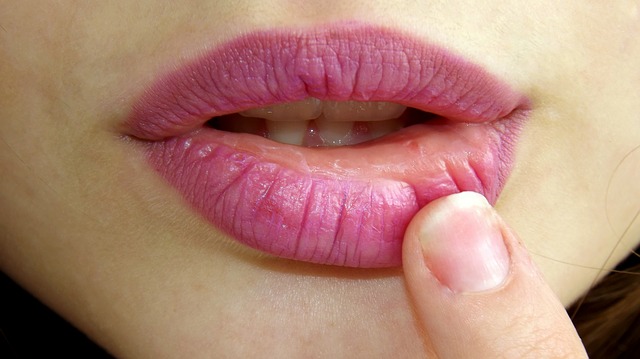Would you be shocked to learn that more than 50% of Americans have herpes?[1] Herpes Simplex Virus is an incredibly common infection that stays in your body for life. Though it is incurable, herpes is treatable and many people who have it never develop any outward symptoms.
If you’re living with herpes, the right treatment can ease your symptoms and reduce your risk of passing it to someone else. Whether you have the virus or not, it’s important to learn the basics about the different types of herpes, how they can be treated, and how to prevent the spread of infection.
What Is Herpes?
The infection commonly known as herpes is caused by several similar but different viruses. Out of more than 100 known herpes viruses, only 8 routinely affect humans and 2 are most common: HSV-1 and HSV-2.[2]
Herpes simplex virus type 1 (HSV-1) is also known as oral herpes and herpes simplex virus type 2 (HSV-2) is known as genital herpes. Both types are spread through skin-to-skin contact and can cause the development of sores on the genital areas as well as the lips, throat, and mouth.
Herpes Simplex Virus Type 1 (HSV-1)
HSV-1 is incredibly contagious and endemic worldwide. According to the American Sexual Health Association (ASHA), roughly 1 in 2 people aged 14 to 49 in the United States are infected with HSV-1. Globally, it is estimated that nearly two-thirds of the world’s population under the age of 50 (more than 3.7 billion people) carry the virus.[3]
Oral herpes, as the name suggests, is transmitted through oral secretions or sores on the skin around the mouth and lips. HSV-1 can be spread through shared eating utensils, sharing lip balm, or even kissing someone who has HSV-1.
In most cases, it causes cold sores and fever blisters to form around the mouth and face, though symptoms can also spread to the throat or eyes in serious cases.
Most people living with herpes were infected during childhood or adolescence, often through non-sexual contact. HSV-1 can, however, be spread through oral contact with the genitals. This makes it one of the primary causes of genital herpes or HSV-2.
Herpes Simplex Virus Type 2 (HSV-2)
Genital herpes or HSV-2 is almost exclusively transmitted through sexual activity. When a person is first infected, the symptoms can be quite severe.
The most common symptoms are blisters or sores on the external genitalia or anal region as well as pain and itching, vaginal discharge, pain while urinating, and tender or enlarged lymph nodes.
Though 50% of the American population carries the HSV-1 virus, only 15.5% of people in the United States have HSV-2. Worldwide, genital herpes affects an estimated 417 million with infection being most prevalent in Africa (31.5%) followed by the Americas (14.4%).[4]
Treatment Options For HSV
Herpes simplex virus is typically diagnosed through physical exam and a review of symptoms. If your doctor suspects that you’re infected with the virus, he may request HSV testing known as a herpes culture.
This involves swabbing an active sore for laboratory testing. If you don’t currently have symptoms, your doctor may test your blood for antibodies to HSV-1 and HSV-2.
Because herpes is incurable, treatment is generally focused on healing active sores and limiting future outbreaks.
In some cases, herpes symptoms resolve without treatment but drugs like acyclovir (Xerxes or Zovirax), famciclovir (Famvir), penciclovir (Denavir), and valacyclovir (Valtrex) can reduce your risk of transmitting the virus and may lower the intensity or frequency of your outbreaks as well.[5]
The Following Home Remedies May Also Help Mitigate Symptoms:[6]
- Using a cold or warm compress to minimize pain and swelling during an active outbreak.
- Mixing one part apple cider vinegar with three parts warm water and applying to the infected area to reduce inflammation.
- Including antioxidant-rich foods in your diet to boost your immune system.
- Taking zinc supplements to reduce the frequency of herpes outbreaks or eating zinc-rich foods like chickpeas, lamb, and pork.
- Diluting tea tree oil with a carrier oil and applying it to cold sores or genital blisters to enjoy the natural antiviral benefits.
- Applying aloe vera gel to the affected area to soothe pain and speed healing.
Every case of herpes is unique. Some people experience a single outbreak when they are infected but go for years without a recurrence while others experience regular outbreaks. Ask your doctor about the treatment options available to help choose the right option for you.
Preventing The Spread Of Herpes
Though herpes can’t be cured, it can be managed with proper treatment and many people go for years without an outbreak of symptoms. HSV outbreaks are often preceded by burning, tingling, or itching at the infection site as well as flu-like symptoms such as fever and fatigue.
For most people, these symptoms last no longer than 10 days and they may become more infrequent and less severe over time. [7] There are, however, certain things that can trigger an outbreak:
- General illness or other infections
- Chronic fatigue
- Physical or emotional stress
- Immunosuppression
- Trauma to the infected area
- Menstruation in women
Recognizing the signs of an impending outbreak is important, as you are more likely to spread the disease if you have open sores or blisters. To prevent the spread of herpes simplex virus, always wash your hands after touching the infected area.
Use condoms or latex barriers during sexual activity at all times and avoid sexual activity during an active outbreak.[8]
Herpes is an incredibly common and contagious infection. Because the virus can lie dormant for years at a time, many people don’t even realize they have it.
Practicing safe sex is an important aspect of prevention and you should consult your physician at the first sign of symptoms for your own health and for the safety of others.

Bio:
Infographic Source: Hims’ blog HSV-1 vs. HSV-2.
You can find much more information on living a holistic lifestyle in these free magazines and on our YouTube channel.
[1] Genital Herpes – Basic Fact Sheet. (n.d.). Retrieved from https://www.cdc.gov/std/herpes/stdfact-herpes.htm
[2] Whitley, Richard J. Medical Microbiology (4th Edition). Retrieved from https://www.ncbi.nlm.nih.gov/books/NBK8157/
[3] Statistics. (n.d.). Retrieved from http://www.ashasexualhealth.org/stdsstis/statistics/
[4] Herpes Simplex Virus. (2017, January 31). Retrieved from https://www.who.int/news-room/fact-sheets/detail/herpes-simplex-virus
[5] Genital Herpes Medications Chart. (n.d.). Retrieved from https://www.webmd.com/genital-herpes/genital-herpes-medications
[6] Watson, Kathryn. (2018, September 12). Try This: 37 Home Remedies for Herpes Simplex Virus-1 and -2. Retrieved from https://www.healthline.com/health/sexually-transmitted-diseases/home-remedies-for-herpes
[7] Brazier, Yvette. (2017, November 13). Symptoms, Causes, and Treatment for Herpes. Retrieved from https://www.medicalnewstoday.com/articles/151739.php#causes
[8] How is Herpes Prevented? (n.d.). Retrieved from https://www.plannedparenthood.org/learn/stds-hiv-safer-sex/herpes/how-is-herpes-prevented






